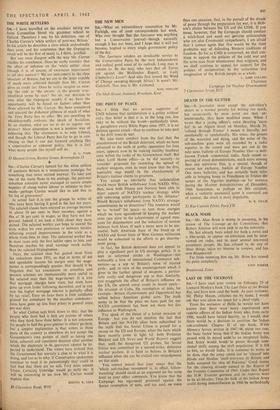SIR,—Charles Curran's lament for the white settlers of southern Britain
is a monotonous nostalgia for something that never existed anyway. To take just one of the many flaws in his analogy, the post-war suburban colonists never managed to secure ample supplies of cheap native labour to minister to their needs—perhaps Curran would like to add this to his list of grievances?
In actual fact it is just the groups he writes of who have been having it good in the last ten years. The salaried classes have enjoyed an average increase of about 54 per cent. in their incomes, against a rise of 56 per cent. in wages, so they have not lost ground. Indeed if we look a little closer they have gained. The salaried worker can hope to ascend the scale within his own profession or industry besides achieving overall improvements in the scale as a whole from time to time. The industrial worker has in most cases only the first ladder open to him, and therefore reaches his peak earnings much earlier than the salaried Orpingtonian.
Next, the salaried man has gained most from tax reductions since 1951, so that in terms of net and spendable income his margin over the wage- earner is correspondingly greater. Nor should it be forgotten that tax concessions on annuities and pension schemes are immeasurably more useful to the salaried man than the wage-earner. It is true that mortgage charges have risen, but rents have gone up even faster following decontrol, and in any case the higher mortgage interest is partially offset by tax relief. Even on fares there is little justifiable ground for complaint by the exurban commuter: fares have gone up less than prices in general since pre-war days.
So what Curran says boils down to this: that the people who have had it best are jealous of others who they think have done better. It is not unknown for people to find the grass greener in others' gardens, but a simpler explanation is that voters in these Parts of the country as elsewhere do not accept the Government's own picture of .itself as taking one calm, coherent and consistent decision after another which the electorate in its ignorance cffnnot be ex- pected to understand. The voters have noticed that the Government has scarcely a clue as to what it is doing, and less as to why. If Conservative spokesmen continue to treat it so patronisingly they could in fact find that there are no safe Tory seats outside Ulster. Certainly Uxbridge would go early on: it will be interesting to see how Mr. Curran would explain that.


































 Previous page
Previous page